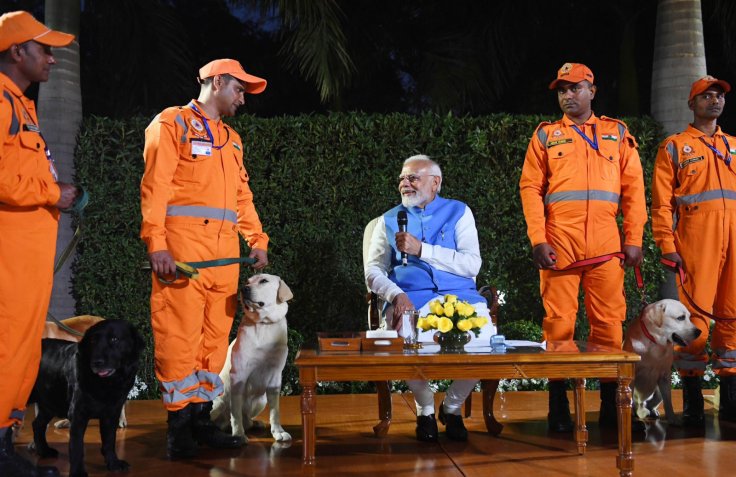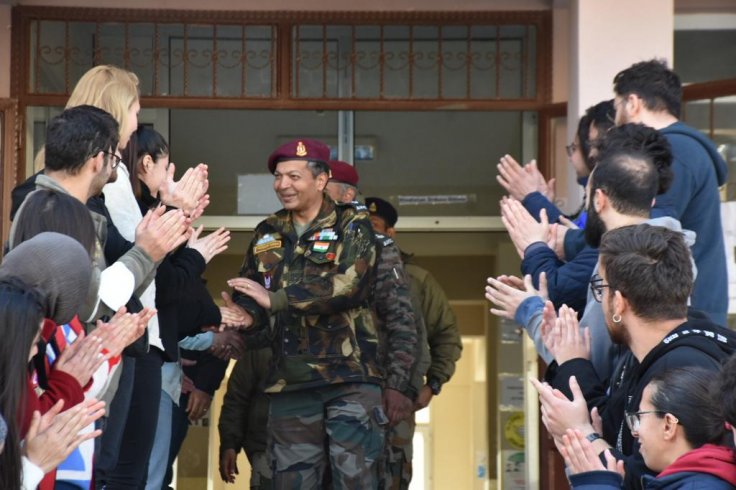On 6 February 2023, a Mw 7.8 earthquake struck southern and central Turkey, as well as northern and western Syria. The death toll in Turkey according to the latest news reports has climbed above 41,000, while six people were killed in the latest earthquake to strike the border region of Turkey and Syria on 20 February 2023. On 21 February 2023, a magnitude 6.3 earthquake struck the Turkey-Syria border region again, killing at least six people. The global aid effort is ongoing to help those affected by the disaster.
The Government of India initiated a search and rescue operation dubbed 'Operation Dost' and launched it on February 10, 2023, to aid Syria and Turkey after the earthquake. India sent its first plane-load of aid to Adana, Turkiye on February 7, and provided humanitarian assistance to both Turkey and Syria. An Indian Army medical team returned from providing extensive services to earthquake-hit people in Turkey on 20 February 2023. Prime Minister Modi interacted with teams involved in 'Operation Dost' on February 20.

India sent disaster relief management teams to Turkey and Syria, with a military heavy lift aircraft carrying more than 35 tonnes of relief materials sent on 12 February 2023. India is providing materials, supplies, medical supplies, and equipment to Syria as part of 'Operation Dost' and is part of the country's tradition of providing humanitarian assistance without expecting anything in return. Turkey has expressed its gratitude for India's assistance under Operation Dost, with Turkey's ambassador to India, Firat Sunel, calling it a "testimony of the strong friendship between the two countries". The operation was christened as 'Dost' which means 'Friend' in Hindi as well as Turkish language. Under Operation Dost, India has sent search and rescue teams, mainly three teams of the National Disaster Response Force (NDRF), a field hospital and relief material.
India-Turkey relations have a long history and have been strengthened by the exchange of visits of high-level dignitaries. In recent years, India has awarded a consortium of Turkey's top five leading shipyards a contract of naval shipbuilding worth $2.3 billion, and bilateral trade between India and Turkey has increased from $8 billion to $10 billion between 2018 and 2021. However, the stalemate in India-Turkey relations stems from Turkey's inability to decouple itself from Pakistan and the Kashmir issue. India and Syria too have a long history of friendly political relations based on civilizational ties, experience of imperialism and of being colonized, and a secular outlook. India has traditionally had good relations with Damascus, with Syria strongly supporting India in various international organisations and India abstaining on most of the UN resolutions against Syria.
India has a policy of providing assistance to its neighbouring countries during natural disasters, such as the 2004 tsunami and the 2005 Kashmir earthquake. India's approach to humanitarian assistance includes providing aid to eight of its neighbouring countries - Afghanistan, Bangladesh, Bhutan, the Maldives, Nepal, Pakistan, Sri Lanka and Myanmar. In 2011, SAARC approved the Agreement on Rapid Response to Natural Disasters (SARNND), which formalised a policy for a cooperative response in times of disaster. India also provides humanitarian assistance in South Asia through various initiatives such as relief camps and medical aid. India has various disaster management programs run by the National Disaster Management Authority (NDMA) such as the National Cyclone Risk Management Project, School Safety Project, Decision Support System and others. Other programs include the National Cyclone Risk Mitigation Project (NCRMP), Infrastructure Development for 10 Battalions and 10 teams of NDRF, Upgradation of National Fire Service College, and World Bank's India Disaster Risk Management Program.

The Turkish people have responded positively to India's Operation Dost, expressing their gratitude to the Indian rescuers and lifesavers with handshakes, clapping and hugs via social media and television interviews. The Syrian people too have expressed their gratitude to India for its humanitarian support in the aftermath of the earthquake. The Indian envoy to Syria Dr. Ausaf Sayeed, Secretary (CPV & OIA), H.E. also visited the affected areas to assess the situation and provide assistance. India has sent two planes of relief material to Syria since February 11, 2023, and is interested in boosting cooperation with Syria during the reconstruction stage.
India is also recognised as a compassionate regional power that is quick to respond and capable of providing international relief.
India has been internationally recognized for its humanitarian relief efforts, with the US Agency for International Development (USAID) providing funding to support emergency COVID-19 relief efforts in India. India is also a collage of regional powers with overlapping boundaries and recognizes multiple forms of agency beyond material power. These qualities have enabled India to become an inclusive world leader, recognizing differences in perspectives or world views rooted in cultural, religious, socio-economic, regional, and other factors.
[Disclaimer: This is a guest article by Arshia Malik, who is a columnist and writes on critical thinking in Islam. She has been an educationist for over three decades and is now researching the 'silent voices' in the Muslim world who don't find courage to speak up due to the lack of critical thinking space. The opinions expressed in this article are author's own]









